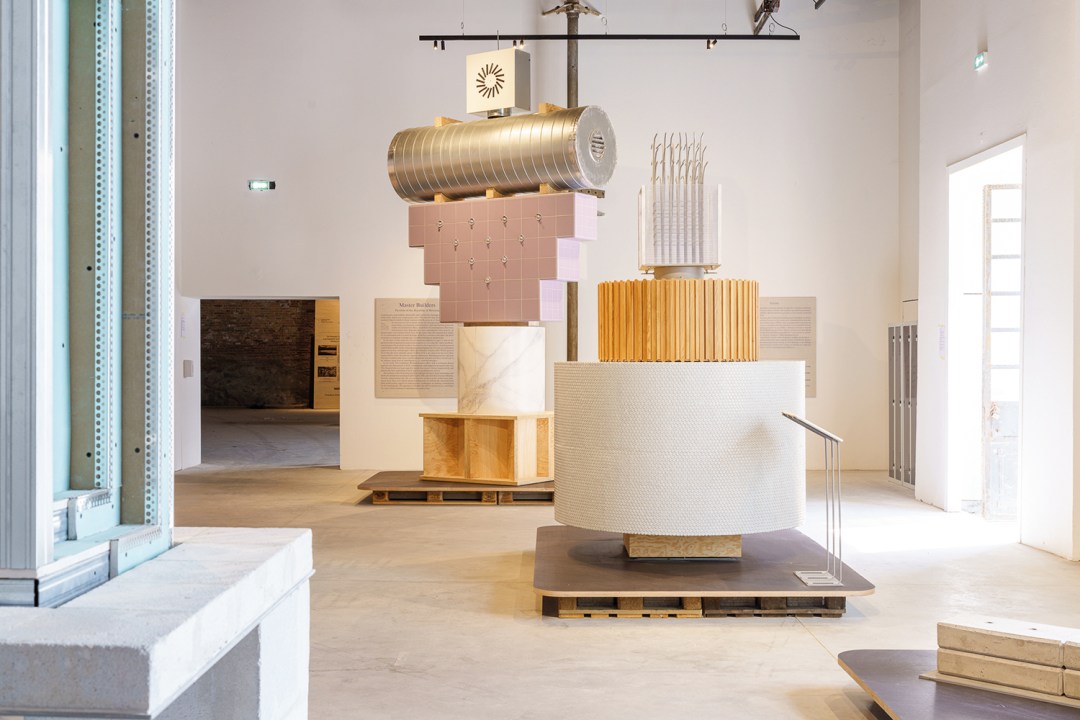
Much of Venice’s Giardini this year was as boarded up as a British high street. The Israeli pavilion was empty, apparently awaiting refurbishment. (At the 2024 art biennale, the curators had closed it in the face of pro-Palestinian protests, prompting the latter to demand it should be opened, presumably so they could protest its closure.) The Russian pavilion has been shut, by order of the Biennale, because of the Ukraine war. The Venezuelan pavilion was closed (‘Go look at nature instead,’ said the workman when I approached it.) The Czechoslovakian was shut, the turns taken by the two independent nations faltering during Covid. The French was closed for refurbishment, although given the political and artistic climate this seems to be an opportune strategy rather than a pressing heritage need. Expressing oneself through the nation, the largest political collective available to the artist, seems to be a problem at the moment, from without but also within.
But there was nothing to see here in another way. The closures go hand in hand with a current trend among curators at the Venice Architecture Biennale: making the pavilion about the pavilion itself. The Finns showed off a recent paint job on theirs. The Koreans used their building as a device to look at the world around it, periscope and all. The Japanese pavilion featured a clunky animation in which different parts of the pavilion engaged in a deeply unrevealing conversation with each other. The curators of the Swiss pavilion imagined an alternative pavilion by the country’s first registered female architect, overlaid on the one built by Bruno Giacometti (brother of Alberto). The result is a very large number of walls. Most emblematic, in many ways, was the Danish pavilion which simply presented the renovation of the building frozen halfway through, an impeccably delivered act of nothingness.
But nothing will come of nothing, as we Brits know. In 2018, our pavilion was both empty and somehow about itself, an act that the curators, Adam Caruso and Peter St John, offered several meanings for: ‘Brexit, isolation, colonialism and climate change’. In hindsight, this marked the endpoint in the creative powers of Caruso St John, once the leading lights in British contemporary architecture, unable to maintain direction due to their profound suspicion of the public with its hunger for resources and icky populism. This year we had the good grace to hand it over to the Kenyans, who returned the favour by making some very beautiful models of caves, including one that was used to hold slaves – although apparently not by us.
Of course, the Venice Architecture Biennale has been about the depiction of crisis for most of this century and things still stumble on in the real world. Architecture is not dead – despite Patrik Schumacher, principal of Zaha Hadid’s office, delivering the funeral rites after the 2023 Biennale. What is dead, or at least very broken, is the relationship of the art form and the profession to popular needs, desires and aesthetic preferences. All of which is not to say that the Biennale isn’t valuable or enjoyable – even if what we’re offered is different flavours of nothing. It’s fascinating to watch a whole cadre of professionals across Europe taking the art form to what must be a nadir. The liberal consensus of the 1990s put architects in the box-seat. Now we’re in an era of populism, their response is to sulk.
But the Giardini – restrained by its late 19th-century dimensions – is not the only place where nations present themselves at Venice because, despite the closures and emptiness, the Biennale is actually growing. In 2018, before Covid, the number of nations participating was 63, this year it is 66 and most of those are stacked around the main exhibition in the Arsenale where the Venetians made the boats and bullets with which they built their empire. Here, where the smaller nations’ pavilions are squished into warehouses, instead of self-indulgence and angst there is a sign of something else. North Macedonia, Macau, Uzbekistan, Bahrain, Togo, all offer fascinating insights into their country through architecture; celebrating their awkward histories, reconciling it to new conditions. Some of the most sensitively representative displays spring from autocracies. In the Saudi pavilion, Syn Architects showed how a quiet modernism might be married to indigenous architecture without diminishing either part.
It’s fascinating to watch architects across Europe taking the art form to what must be a nadir
Best of all, though, is the Slovenian pavilion which in barely 30 square metres explores through a charming architectural language one of the real issues that the profession and the built environment faces; how to wrest quality from uniformity. Architects Ana Kosi and Ognen Arsov scavenged left-over materials from a large housing development and, imagining a series of totems that might incorporate those materials, they paid a group of relatively unskilled labourers to learn how to make them. The results have something of the Italian postmodern about them: Sottsass but with plastic pipes and taps. The title The Masterbuilders is clearly ironic but the work elevates everyone involved. It offers a glimpse of a nation, its needs, preoccupations and aesthetic solutions.
The nothingness that haunts the Giardini is contrasted with a madly cluttered main exhibition in the Arsenale, curated by the Italian architect turned techno-wonk Carlo Ratti, who now teaches at Massachusetts Institute of Technology. Shorn of the need to articulate a relationship to the polis – unlike with the national pavilions – Ratti’s response is to assert the technical prowess of the architect. Rumour has it that the reason behind his manic packing of the space is that he was deprived of a second area in the Giardini due to refurbishment. Meanwhile the reason behind the lack of discernment or care in the curatorial choices and arrangement was because he conducted an open call rather than selecting projects himself. Faced with a huge number of entrants he had to include them all is the argument. Possibly true.
The 1990s put architects in the box-seat. Now we’re in an era of populism their response is to sulk
The result, in the main, is a material library. The abiding visual experience is of tables of little beige lumps – produced by bacteria, fungi or elephant dung – that occasionally cohere into brick-like things. There are mounds of rammed earth, reconstituted wood and marble dust; hors d’oeuvres apparently for some feast of eco-building somewhere down the line. There are building projects, but we see them only through tiny photos or via graphics printed on boards stuck to the walls down the side of the main thoroughfare. Many of them are experimental, most of them small scale and some of them quite old. We get glimpses at knee height or above our heads of what might be done, but generally it’s like reading the AI summaries of so many PhDs. Odd-sounding institutions – often called ‘Labs’ in places such as Cornell or ETH in Zurich – are much in evidence.
Ratti’s suggestion, prior to the event, that architects should accept climate change as a given and act accordingly was potentially liberating but his response – a welter of different approaches – much less so, especially when cleaner, more sustainable concrete is a viable goal. We have regressed since 2004 when Anthony Vidler wrote of the ‘expanded field’ of architecture and described how aesthetically the profession was encroaching into areas of not-architecture – particularly landscaping and biology – driven by a need to address the repercussions of modernity. Ratti’s exhibition leaves the impression that the field expanded so wide that at a moment of political crisis, it has collapsed in on itself. We are left with the fragmentary results of that process. Ratti hoped his Biennale might reassert the autonomy of architecture but he has not delivered.
Given the sheer profusion of stuff he’s chucked into the Arsenale, though, other futures can be found, even if one has to rummage. If I think back to Vidler, the not-architecture that architecture must embrace is infrastructure. There are glimpses of this relationship here and there in this beige bric-à-brac of a show. Pininfarina, for example, the Italian designers that once dreamed up the fine curves of the Alfa Romeo Spider, present a model of a small modular nuclear reactor, which stands like a well-dressed Piedmontese lady in a dive bar, a reminder of the ubiquity of style. Whether any of this stuff will reach the real world, and what it will be used for, isn’t entirely clear. Perhaps it’s time for the public to demand a bigger vision.
The Venice Architecture Biennale 2025 runs until 23 November.








Comments